- Home
- Steve Hockensmith
World's Greatest Sleuth! Page 2
World's Greatest Sleuth! Read online
Page 2
“Alright, alright! You made your point!” my brother snapped. “We’ll give it a go. I reckon we ain’t got nothing left to lose.”
I nodded happily. “Nothing but our dignity … and we ain’t been usin’ that for much anyhow!”
It was hard to be certain, but it sure looked like Gustav rolled his eyes behind his glasses. Frantic packing and hurried good-byes followed immediately thereafter, and within hours we were on a northbound train.
Now, as you might have noticed, I’m a fellow who doesn’t mind flapping his gums. When Old Red and I travel modern-like, though, it’s not a matter of habit—it’s strict necessity. My brother can neither read nor stomach rail travel, you see, and the one thing that’ll keep him from retching and kecking is a steady stream of detective tales orated by yours truly.
And only one detective will do. We’d sampled Nick Carter, King Brady, Old Sleuth, and every other dick with a dime novel to his name, but none had ever won my brother over. “Defectives,” Gustav called them. “They don’t solve mysteries. They beat them into submission.” So it was all Holmes Holmes Holmes as we chugged toward Chicago.
With a little Diana Diana Diana on the side, perhaps. The first story Old Red asked to hear was “A Scandal in Bohemia”—a yarn he often turns to when trying to make sense of our pretty detective friend.
I’m not the great sleuth of the two of us, but this much I’d long ago deduced: My brother was half in love with the lady. And if he wasn’t, he was crazy, for I myself was completely in love with her and couldn’t understand how any other man wouldn’t be. She was as clever as Gustav, as silver-tongued as me, as brave as either of us, and more attractive than the both of us put together (my brother being a bit of a minus to my plus).
She was kindhearted to boot, for she’d been trying to talk her boss into hiring us on for his new detective agency. This was proving a challenge, however, for the boss in question was one Col. C. Kermit Crowe, late of the Southern Pacific Railroad Police—“late” because he’d been unwise enough to hire us just before we ran an S.P. locomotive off a cliff. Believe it or not, some folks will hold a grudge when you do them like that.
So as I saw it—and suspected Old Red saw it, too—the McClure’s contest wasn’t just the best shot we’d ever get at fame and fortune. It was maybe the only way we could hope to get close to Diana Corvus again.
Of course, my brother never came right out and said any of this. He makes it a habit not to come out and say anything, if he can help it. But the mere fact that he didn’t jump off that train at the first opportunity sure said something.
We were due to arrive late Monday morning, and I awoke at dawn that day, heart pounding with excitement. Most of our fellow passengers were up early, too, and by eight o’clock there was hardly a one not kitted out in their finest frock coat or day gown, as if we were headed not to a World’s Fair but a Sunday service. The Exposition may have been created to celebrate the four hundredth anniversary of Chris Columbus’s voyage to America, but everyone knew it wasn’t really about the past. With its treasures and scientific wonders gathered from all around an ever-shrinking earth, “the White City” was where you went to greet the future. It was a more perfect world we were supposedly moving toward, and folks meant to get there looking picture-perfect themselves.
In this same spirit, I shaved, pomaded my hair, and put on my best suit. When Old Red returned from his morning toilet, however, he was still wearing the wrinkled work duds he’d slept in.
“Tell me you ain’t gonna get off the train lookin’ like that,” I said as he plopped down beside me.
“What am I supposed to look like? Diamond Jim Brady?”
“No. But I’d rather you didn’t look like a hungover dirt farmer, neither. Can’t you at least put on a tie?” I reached under our seat for my carpetbag. “Good thing I’ve got style enough for two. Now whadaya prefer: neck tie or bow?”
“I prefer not to strangle myself with any d- … d- … damn…”
I peeped up to see what was gumming my brother’s mouth, and there it was out the window, miles away yet already coming into view as we rounded a bend in the tracks.
Chicago.
Clustered towers of dark steel jutted up into grimy-gray clouds. Huge smokestacks belched black from beside factories and vast stockyards. And stretching out and around us like the giant web of some frightful spider: electrical wires, telephone lines, tracks, streets, gutters.
“Christ almighty,” Gustav muttered. “I almost wish I was still blind.”
For the next half hour, we cut through the slaughterhouses, manufacturing plants, tenements, and all-around ugliness that ringed the city. There was much murmuring and shaking of heads among the other passengers, and the air of anticipation with which they’d begun the day gave way to something approaching disgust.
If this was the future, God help us all.
Eventually, however, a little shriek of excitement went up somewhere behind us: “I see the lake!” Sure enough, there out the window, visible in sapphire stripes flashing between the muddled brown of the buildings, was Lake Michigan. It stretched all the way to the horizon—seemed to merge with the azure sky, in fact, so that there was hardly any horizon at all. Just a wall of blue so big you’d hardly believe the world could contain it.
Then another cry went up, and suddenly everyone was pressing against the windows so hard it’s a wonder the train didn’t tip over.
“The fairgrounds!”
“The Exposition!”
“The White City!”
Domes, that was all I could see. Huge orbs, four or five of them, jutting up as rounded and gleaming as giant eggs. The buildings beneath were blocked from view by the massive terminal we were pulling up to and the dozen other trains already lined up on the long row of tracks before it.
We eased to a stop amidst such a furious tumult of activity as to make a beehive look like a mortuary. Passengers pouring from the neighboring trains pushed toward the station through the still-swirling engine steam, while porters piled luggage onto pushcarts and bellowing news butchers hawked guidebooks and maps.
“You ready for this?” I asked my brother.
It’s not just trains he doesn’t care for. Crowds he’s not overfond of, either, and cities he can’t stand.
So far, the Exposition looked like his definition of hell on earth.
“Ready as I’ll ever be,” Old Red grumbled. “By which I mean no.”
Yet he snatched up his gripsack and got to his feet.
Soon we were flotsam in the swirling deluge of humanity on the platform. As we were jostled this way and that, I tried to stay on tippy-toe so as to spy or be spied by our backer, Urias Smythe.
I’d wired ahead to tell him our arrival was imminent and all he had to do was meet us at the station for his prayers to be answered. I knew the man only from his letters and (God bless him) money orders, though, so I couldn’t so much search for him as try to look conspicuous and hope for the best.
I didn’t have to try hard. With our matching red hair and mismatched builds—mine strapping, my brother’s slight—Gustav and I couldn’t pull off inconspicuous on our best day. And this, it would turn out, was far from our best day.
I spotted a big, jowly, bald-headed fellow squirming against the current of the crowd, and when he noticed me watching him, his eyes narrowed … and then, upon falling on Old Red, popped wide.
“Mr. Smythe?” I called to him with a tentative wave.
He answered my question by throwing out his own in a tremulous, squeaky-high voice.
“Otto Amlingmeyer?”
I nodded, and ever so slowly Smythe turned toward us and started our way. A moment later, I thrust out a hand as the man who’d plucked us from obscurity and destitution stood before me for the first time.
Smythe didn’t seem to see my hand even as he looked me and my brother over head to foot and back again.
Old Red’s shabby clothes and shaded cheaters got the longest look of all.<
br />
“This is Gustav?” Smythe asked.
“Indeed it is, and pleased as punch we both are to be here.” I stuck my hand out so far now it just about poked the man’s belly button. “We want to thank you for this opportunity, sir. I promise you, you won’t regret puttin’ your faith in us.”
It was too late for that particular promise, though. Rather than give me a shake, Smythe put his hands to his face.
“Oh, my God,” he blubbered. “I’m ruined!”
3
PINS AND NEEDLES
Or, Smythe Frets About Losing His Shirt While Gustav Comes Apart at the Seams
When faced with displays of emotional distress, my brother typically employs the response preferred by most cowboys. He coughs awkwardly, looks away, and waits for the moment to pass. So my publisher got no tender words of comfort from Old Red, though it sure looked like he could use a few. With his hairless head and round, red-cheeked face, Smythe resembled nothing so much as a huge, bawling baby diapered in a black business suit.
I might have jumped in quicker to soothe him myself but for one thing: It was obviously the sight of me and Gustav that had primed the pump for his tears. I’d be the first to admit we didn’t exactly look like Sir Galahad and Lancelot charging in on white steeds, but surely we weren’t that uninspiring.
Well, surely I wasn’t, anyway.
After a long moment trying to decide how insulted I should feel, I pulled out a handkerchief and offered it to the man.
“Thank you.” Smythe took the hankie, blew an immense, snorking noseful into it, then handed it back. “I do hope you’ll forgive me. These have been trying times. Trying times, indeed!” He sucked in a deep breath, and the crimson flush on his face faded to a more presentable pink. “There’s no time to dwell on that now, though.”
He turned aside to flag down a porter.
“We ain’t got no trunks, if that’s what you’re thinkin’.” I gave my carpetbag a little waggle. “Me and my brother travel light.”
“Of course. So you always say in your stories, and so far they’ve proved quite accurate. For the most part.” Smythe stole another quick, quiver-lipped peek at Gustav, then leaned toward me and dropped his voice. “Your brother … he’s not blind, is he?”
“Not anymore,” I whispered back.
This did not seem to put Smythe at ease.
“I ain’t deaf, neither,” Old Red snapped.
“Oh, I’m so sorry!” Smythe spluttered. “But it wouldn’t have surprised me if you were deaf, dumb, and blind after what I’ve been through the past few days.” He grimaced and fluttered his hands in the air. “I’m just all higgledy piggledy!”
“Now, now. Everything’s gonna be fine,” I said soothingly. If I’d had a lollipop, I’d have given it to him. “Why don’t you explain the situation, and we’ll—”
Smythe gave me an emphatic, wattles-flapping shake of the head. “Explanations can wait. Follow me!”
He spun on his heel and hustled off toward the terminal building.
Gustav looked at me.
I shrugged.
We followed.
The milling crowd was thick as ever inside the station, but Smythe’s gut cut through it like the prow of some mighty ship. “One side! Official business!” he’d blare when the multitudes didn’t part quick enough to suit him. So busy was I apologizing on his behalf, I couldn’t even grab a good look at the building till we were nearly out of it again. All I got was a quick glimpse of glistening marble and beveled glass and long-lined ticket windows, and suddenly we were pushing through turnstiles while Smythe waved a blue ribbon at the attendants nearby.
“Official business!”
Then we were outside again … and we were in the White City.
Smythe kept charging on ahead. My brother and I stopped dead in our tracks.
To our left was what looked like a vast castle bedecked with dozens of flapping banners—the largest single thing we’d ever seen spring from the hands of man. When we turned to the right, we saw something even bigger. It was the castle times two with the White House and the Vatican thrown in for good measure.
“Gentlemen, please!”
The voice seemed to drift to us from an almost otherworldly distance, as when someone speaks to you while you’re still half-asleep in a dream. I blinked and looked ahead and found Smythe fifty feet beyond us, waving frantically for us to follow. Behind him was yet another marvel: a stately, statuary-studded structure adorned with pillars, huge arching windows, and, up top, a towering gilded dome aglint in the sunshine. It looked like heaven’s own county courthouse, and it was apparently our destination.
Gustav and I set off for it with slow, stumbling steps. As we walked, my brother swung his gaze this way and that, still trying to take in the enormity all around us. It was a good thing he was wearing his tinted specs, for so far the White City was living up to its name. Nearly everything was blinding-bright pristine white.
“How your eyes doin’?” I asked.
Old Red shook his head. “I ain’t sure. I don’t know whether to believe ’em or not.”
“You can gawk later!” Smythe fussed, urging us on with a paddlewheel-spin of the hands. “We’re running out of time!”
“But your telegram said everything’d be fine so long as we were here by noon,” I pointed out.
“Yes! And it’s ten till, you big—!”
Smythe caught himself just in time.
“Red,” he said. “Now please stop dawdling. There’s not a second to spare!”
He turned and set off for that huge bedomed building again, and soon we were pushing through the doors. Inside, we were stopped by a fellow wearing a blue uniform with a brass star and a short, scabbarded sword—obviously a member of the Columbian Guard, the Exposition’s famous army of private police.
“Sorry, gentlemen. The Administration Building’s not open to—”
Smythe waved his blue ribbon. “Official business!”
The guard stepped back and let us pass.
“The contest’s gonna be in here?” I asked as we continued down a broad, marble-tiled hall.
“No, no, no! The Exposition’s loaned us an office for the week, that’s all.”
Smythe threw open a door and shooed us into a small room. A typewriter-topped desk had been shoved into one corner, but beyond that and a few lights along the wall—electric bulbs, I noted, not gas jets—the little room was free of any other furniture or fixture.
Two tall stacks of boxes bookended the typewriter on the desk.
“Alright,” Smythe said. “Time to get into your costumes.”
“Our what?” Old Red blurted out before I could.
Smythe turned to the desk, opened one of the bigger boxes, and pulled out a ten-gallon hat so high-peaked and pure white, seen from a distance you’d think it was the Swiss Alps. This he handed to my brother. Then he reached into another box and produced a round-topped Boss of the Plains that was, amazingly, even larger—and bright red. This, to my horror, he handed to me.
“They go on your heads!” Smythe snapped when we didn’t immediately slap the hats on.
“It’s awful nice of you to give us these,” I said. “But … well … a red Stetson? Black, white, or brown, that’s all a real cowboy’d ever—”
“What’s ‘real’ got to do with it? I’ve already made”—here Smythe’s voice went warbly—“a substantial investment in this undertaking. Even if it can’t be recouped, I don’t mean to see it wasted entirely. We have an opportunity to paint a public portrait of you that suits our purposes, and we’re going to make the most of it.”
Smythe turned back to the packages. As he sorted through them, a magazine tucked between two boxes fell fluttering to the floor. It landed cover up.
Smythe’s Frontier Detective, it was called. I’d never heard of it. Which was ironic, since it had heard of me.
“OLD RED,” THE HOLMES OF THE RANGE,
IN: “BUCKAROO SLEUTHS OF RUSTLER’S RANCH!”
BY “BIG RED,” THE COWBOY WATSON
Below all that was a picture of “Big Red” himself, large as life and blazing with color. He and “Old Red” stood back to back, Peacemakers drawn, a gang of desperadoes circling them on horseback.
How did I know which one was Big Red? Well, he was the big one, obviously. The red Stetson was a bit of a clue, too. Not to mention the red chaps, red holster, and red vest worn over trousers and shirt of purest white, with white boots, no less.
Old Red was his opposite—white hat, chaps, holster, and vest, but red shirt, trousers, and boots.
They looked ridiculous, ludicrous, laughable … and that was exactly what Smythe had in mind for me and Gustav. He began pulling out outfits that were identical to the ones on the cover. That magazine had been his tailor’s pattern book.
Smythe moved toward Old Red with a crimson gun belt.
Old Red hopped back like the man was coming after him with a pitchfork.
“Oh, no,” he said, shaking his head.
“Oh, yes,” Smythe said, nodding.
“Oh, no,” my brother said, shaking his head harder.
“Oh, yes,” Smythe said, nodding just as hard.
“Oh. No!” Shake shake shake.
“Oh. Yes!” Nod nod nod.
If it kept up much longer, one or the other was going to break his neck.
“Look, Brother…,” I began.
“I am lookin’!” Gustav raged. “At duds so ugly only a blind fool would wear ’em! And I may be half-blind, but I’m no fool! I ain’t gonna dress up like a blasted barber pole and I ain’t gonna let some snuffy flibbertigibbet boss me around and come to think of it I ain’t gonna play any dumb-ass detectivin’ games, neither!”
With that, he stomped to the door, threw it open, and started marching back toward the train station.
4
ARMSTRONG B. CURTIS, ESQUIRE
Or, Old Red Draws a Line in the Sand and Meets a Snake in the Grass
“I’ll be right back,” I told Smythe as I hustled after my brother. I would’ve preferred saying “We’ll be right back,” but I didn’t want to make a promise I might not be able to keep.

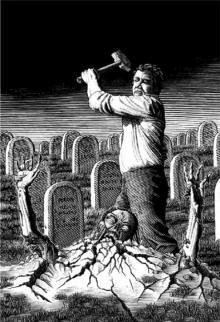 Dawn of the Dreadfuls
Dawn of the Dreadfuls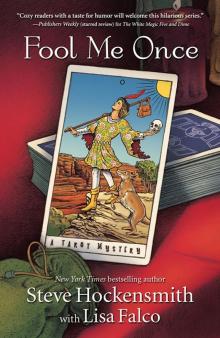 Fool Me Once: A Tarot Mystery
Fool Me Once: A Tarot Mystery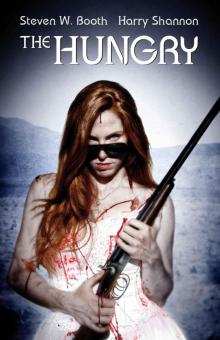 The Hungry
The Hungry Naughty: Nine Tales of Christmas Crime
Naughty: Nine Tales of Christmas Crime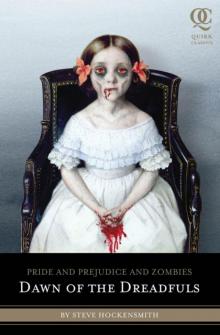 Pride and Prejudice and Zombies: Dawn of the Dreadfuls papaz-1
Pride and Prejudice and Zombies: Dawn of the Dreadfuls papaz-1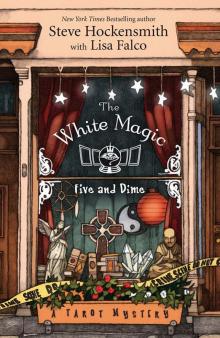 The White Magic Five & Dime (A Tarot Mystery)
The White Magic Five & Dime (A Tarot Mystery)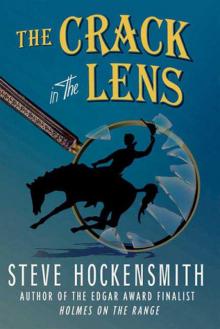 The Crack in the Lens
The Crack in the Lens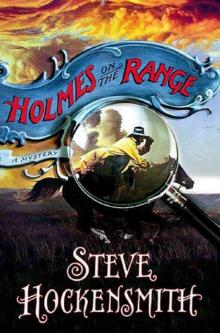 Holmes on the Range
Holmes on the Range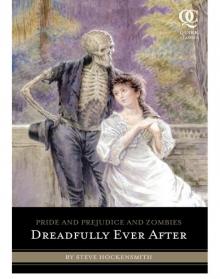 Dreadfully Ever After
Dreadfully Ever After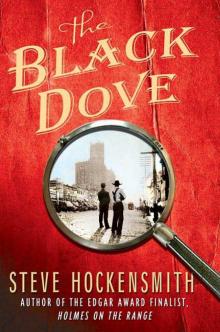 S Hockensmith - H03 - The Black Dove
S Hockensmith - H03 - The Black Dove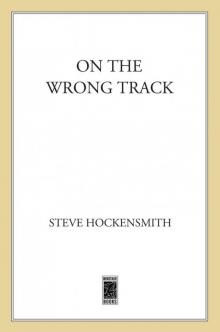 On the Wrong Track
On the Wrong Track Naughty-Nine Tales of Christmas
Naughty-Nine Tales of Christmas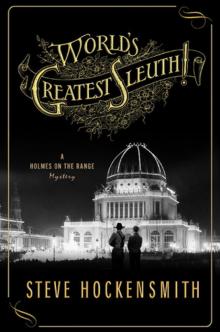 World's Greatest Sleuth!
World's Greatest Sleuth!